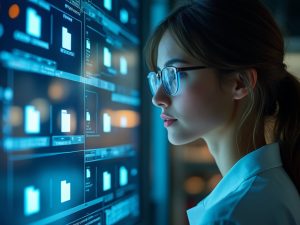In a groundbreaking case last August, a federal court ruled that AI-generated art could not be copyrighted, sending shockwaves through the tech and creative industries. This decision highlights a critical question of our time: How do we reconcile the transformative potential of artificial intelligence with our existing intellectual property laws?
As AI continues to push the boundaries of creativity and innovation, it’s becoming increasingly clear that our current legal frameworks are ill-equipped to handle the unique challenges posed by this technology. From AI-generated content to machine learning algorithms trained on copyrighted material, the intersection of AI and IP law is a complex and rapidly evolving landscape.
In this article, we’ll explore the transformative potential of AI in the realm of intellectual property, examine the ethical and legal quandaries it presents, and consider how we might adapt our legal systems to foster innovation while protecting the rights of creators.
Understanding AI and Intellectual Property

Before we dive into the complexities of AI and IP law, let’s establish a clear understanding of what we mean by AI in this context. Artificial Intelligence, as it relates to intellectual property, refers to systems capable of performing tasks that typically require human intelligence. This includes generating text, creating images, composing music, and even inventing new technologies.
The key types of intellectual property affected by AI include:
- Patents: Protecting inventions and technological innovations
- Copyrights: Safeguarding original creative works
- Trademarks: Identifying and distinguishing brands
- Trade secrets: Guarding confidential business information
As AI systems become more sophisticated, they’re increasingly capable of producing outputs that would traditionally be protected by these forms of IP. This raises fundamental questions about authorship, ownership, and the very nature of creativity.
The Ethical and Legal Landscape
The crux of the debate surrounding AI and IP lies in determining whether AI’s use of existing intellectual property can be considered transformative and potentially ethical. Proponents argue that AI’s creative process adds new value to existing works, much like how human artists draw inspiration from their predecessors.
Consider the case of AI-generated art. While an AI might be trained on millions of existing artworks, its output is often a unique combination of elements that creates something entirely new. Is this fundamentally different from a human artist studying the techniques of the masters?
Legal opinions on this matter are still evolving. In the United States, the Copyright Office has stated that it will not register works produced by a machine or mere mechanical process that operates randomly or automatically without any creative input or intervention from a human author. However, this stance is increasingly challenged as AI systems become more sophisticated and the line between human and machine creativity blurs.
The Debate on AI Training Data

One of the most contentious issues in the AI-IP debate is the use of copyrighted material in training datasets. Machine learning algorithms require vast amounts of data to learn and improve, and this often includes copyrighted works. But is this fair use, or a violation of copyright law?
Ethically, there’s an argument to be made that if AI systems are benefiting from the work of human creators, those creators should be compensated. However, implementing such a system would be incredibly complex. How do you determine fair compensation when an AI has been trained on millions of works, each contributing in small, often indiscernible ways to its output?
Legally, the landscape is equally murky. While some argue that the use of copyrighted material for AI training falls under fair use doctrine, others contend that it constitutes copyright infringement. The EU’s AI Act, currently in development, aims to address some of these issues, potentially requiring AI companies to disclose what copyrighted material was used in their training data.
The Future of AI and Intellectual Property
As we look to the future, it’s clear that our IP laws will need to evolve to address the unique challenges posed by AI. This evolution should aim to strike a balance between fostering innovation and protecting the rights of human creators.
Some potential approaches include:
- Expanding the definition of authorship to include AI systems, potentially with human collaborators as co-authors.
- Creating a new category of IP rights specifically for AI-generated works.
- Implementing a compulsory licensing system for the use of copyrighted material in AI training datasets.
- Developing more nuanced fair use guidelines that take into account the transformative nature of AI-generated content.
For businesses navigating this uncertain landscape, it’s crucial to stay informed about legal developments and to be transparent about the use of AI in creative processes. Implementing clear policies around the use of AI and the ownership of AI-generated content can help mitigate potential legal risks.
Practical Considerations for Businesses
If your business is using or considering using AI in creative development, here are some best practices to consider:
- Maintain detailed records of AI training data and processes.
- Clearly attribute AI-generated content and be transparent about its origins.
- Implement human oversight in AI-driven creative processes.
- Stay informed about evolving legal and regulatory frameworks.
- Consider obtaining legal advice specific to your AI use cases.
Conclusion
The intersection of AI and intellectual property represents both a challenge and an opportunity. While our current legal frameworks struggle to keep pace with rapidly advancing technology, this moment presents a unique chance to rethink how we approach creativity, innovation, and ownership in the digital age.
As we continue to grapple with these complex issues, it’s crucial that we engage in open dialogue and thoughtful debate. The decisions we make today about AI and IP will shape the future of innovation for generations to come.
What are your thoughts on this issue? How do you think we should balance the transformative potential of AI with the need to protect intellectual property rights? Share your opinions in the comments below, and don’t forget to bookmark this blog for more insights into the cutting edge of technology and law.
